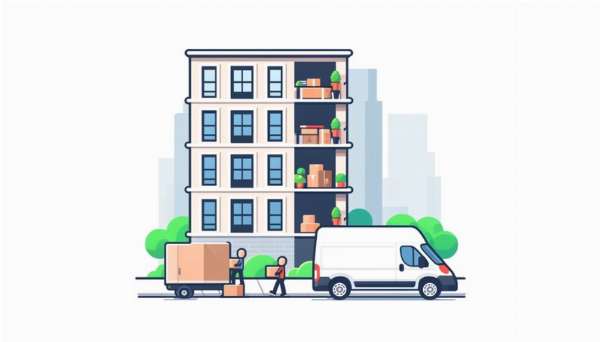In this guide, we’ll cover:
- What to look for and ask about when viewing an apartment
- Smart questions to ask real-estate agents, property managers, and landlords
- What you should know about property policies, maintenance, and lease fine print before you sign
The Most Important Questions to Ask When Renting
Jump to a question:
About rent, deposits, and fees
What’s included with the rent?
About landlord policies
About maintenance
About getting the rental
What to Ask About Rent, Deposits, and Fees
How is rent paid?
Many apartment complexes have online portals where you can pay rent and communicate with your landlord. Some rental properties may require you to mail a check instead. It varies by property, so make sure to ask. When discussing rent payment, also ask:
- What are accepted payment methods for rent (i.e. checks, credit cards, direct deposit, cash, etc.)?
- Are there processing fees for certain payment methods? Using a credit or debit card to pay rent often comes with a fee.
- What are the late fees for paying rent and how are they calculated?
How do rent increases work?
Wondering about rent hikes? Rent increases usually happen annually or at the end of your lease term. Your landlord may notify you in advance about any changes. Laws may restrict how much your rent could increase, or the property manager may honor policies of their own creation. It doesn’t hurt to ask, and understanding how much and how often your rent could go up will help you plan your budget.
Is there a security deposit?
There likely will be, but how much is it?
Under what circumstances would the security deposit not be returned?
Your security deposit may not be returned in full if there are damages beyond normal wear and tear or if you owe unpaid rent. Different properties have different expectations, though, and practices around security deposits vary quite a bit by geography and local laws. Some landlords may routinely dock security deposits for tasks such as carpet cleaning, which means that even perfect tenants can expect to lose a chunk of their deposit. Find out what’s normal in your area, and try to get a sense of how things are handled on this particular property.
Is there a broker fee?
You may owe a real estate agent or broker fee when you sign the lease, especially if you used a real estate agent to find the rental.
Do you require first and last month’s rent?
Many landlords will require tenants to pay an extra month’s rent as a deposit. That may or may not double as your security deposit, so be sure to ask!
Is there an application fee?
If you apply to lease a rental property, you can usually expect to pay an application fee. It may just cover the cost of a background check, but it could be higher. You’ll want to find out exactly how much it is before you apply.
Are there any initial move-in fees?
We’ve covered the major fees, but be sure to check for others!
Ask What’s Included With Your Rent
Are any utilities included with the rent?
Find out which utilities, if any, are included in the rent to avoid unexpected expenses. This is more common in some areas than others, so you may want to ask around. Are your friends in the same city getting certain utilities included in their rent?
How does parking work, and is it included with the rent?
The complex may have reserved spots for each tenant or the parking lot may work on a first come, first served basis. Here are a few things you should ask about parking:
- Is there a shared parking lot or garage, or does each unit have its own garage or space?
- Are there any gates, cameras, or other security measures in the parking area?
- Do I have to pay for a parking permit, or is it included in the cost of rent?
- How many parking spaces are allotted to each unit?
- Are the parking spaces covered?
- Is street parking allowed, or do I need a permit?
Which appliances and furnishings are included with the lease?
You’ll probably have a good sense of whether the apartment includes furniture, but be sure to ask about appliances! In some states and municipalities, landlords have to provide things such as refrigerators, but in others you may be expected to cart in your own. Don’t add “no refrigerator” to your list of moving-day nightmares! Ask ahead and save yourself a major headache.
Do I need renters insurance?
Some landlords may require renters insurance, so it’s essential to clarify that beforehand.
What to Ask About the Landlord’s Policies
What are my options for renewing the lease?
It’s common for tenants to be able to renew their lease, but things can be very different depending on the municipality and the property. If you’re looking to stay in this rental long-term, be sure to find out if your right to renew is protected by law or by property policy.
What is your property’s pet policy?
If you have furry friends, make sure to ask about pet policies, including any additional fees or restrictions. Keep in mind that properties may have different rules for different types and sizes of pets.
What is your guest policy?
Some apartment complexes require all guests to be registered with the leasing office. Some also place a limit on the number of days a guest can stay with the tenant. There may also be a limit on the number of people a tenant can have over at one time to prevent loud parties. If you plan to have lots of friends over and the landlord has a very strict guest policy, it probably won’t be the right place for you to move.
What is your noise policy?
Apartment complexes typically have “quiet hours,” during which tenants need to avoid making excessive noise. The specific times vary from place to place, but they typically start around 10 p.m. If that is detailed in your lease, the landlord may have the right to evict you over noise complaints.
There are two great reasons to ask this question. First, you need to know if you should expect noisy neighbors. Second, you need to find out if your lifestyle fits the policy so you aren’t the noisy neighbor!
How much notice do you give before entering a residence?
The landlord or maintenance department may need to enter your unit from time to time, so it’s important to know how much notice they will give you. A full 24 hours is standard, but some landlords may give you more or less notice. Also ask if there are any emergency situations in which the landlord will enter your apartment without any notice. Be wary of landlords who say they can enter your unit at any time without notice, even if it’s not an emergency.
What changes can I make to the rental?
If there are changes or upgrades you want to make to anything in the apartment, you’ll need to clear it with the landlord first. Double-check to see what is allowed and what isn’t. The landlord may charge for something as small as putting holes in the wall to hang a picture.
What is your subletting policy?
If you anticipate needing to sublet your space, make sure to ask about the landlord’s policy on subletting. Keep in mind that local and state laws on subletting may be a factor too!
If subletting is permitted, keep in mind that it puts you on the hook for certain responsibilities. Check out our guide to subletting liability to learn more.
What are your rules for breaking the lease early?
If you need to move before your lease ends and you aren’t planning or able to sublease your place, you’ll need to break your lease. Each complex or rental property will have different rules and fees for breaking a lease. Make sure to ask the landlord about any costs or penalties listed in your lease.
What to Ask About Maintenance
What maintenance is provided?
You wouldn’t call maintenance to change a light bulb, but where’s the line? Some property managers prefer to handle even relatively small tasks, while others will ask you to call your own plumbers and repair crews even for relatively large problems. Understanding the landlord’s responsibilities for maintenance and repairs can save you headaches in the long run.
Try to get a sense of how prompt the maintenance work will be, but keep in mind that you may get a more honest answer from current tenants than you do from the broker or property manager.
How do I make a maintenance request?
Assuming the property handles some maintenance, you’ll need to know how to contact them and request help.
Are you planning to update the building or unit any time soon?
Apartment complexes upgrade appliances and furnishings in units and amenities throughout the complex every few years. It’s nice to have a new and upgraded home, but that can also mean hikes in rent because upgraded apartments tend to cost more. You’ll also have to deal with the noise and mess of construction if it’s happening near or in your unit!
Finding Out If the Rental Is a Fit, and What to Ask About the Application Process
How soon are you looking to fill the unit?
If you won’t be ready to move for a few months but the landlord is looking to fill the unit in the next few weeks, your odds of landing the place may not be good. Save some time and heartache by feeling out the timeline first.
What is the application process like and what screening criteria do you have?
Don’t hesitate to ask for a detailed outline of the screening and application process. It’s important to know what to expect so you can get a better idea about whether you’ll be a suitable candidate. Ask about screening fees and any credit score or salary requirements.
If a credit check is required, ask if it’s a hard or soft inquiry. Hard inquiries may hurt your credit score, while soft inquiries won’t.
Can you describe your ideal tenant?
Asking this question when looking for an apartment will help you decide if it will be a good fit for you, but it will also tell you a lot about your landlord. If the landlord says they’re looking for someone who will keep the place clean and rent for the next few years, great! On the other hand, if you ask this question and the landlord makes any sexist, racist, homophobic, or other offensive preferences known, that’s a major red flag. Watch out for unrealistic expectations or controlling comments about behavior and noise too.
Is there any crime in the neighborhood?
What’s the neighborhood like? Take the time to ask about the neighborhood, including nearby amenities, safety, and community vibes.
Asking these questions can help you make an informed decision and ensure a smooth transition into your new home.



